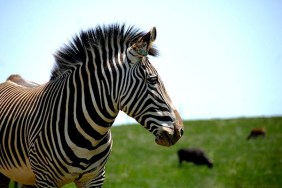The animal world is inextricably linked to the human world. Often, we get answers to our tough questions from observing or studying animals. And if nothing else, they provide great stress relief and often a bit of entertainment. Here’s what’s been happening in animal/environmental news lately.
Birdfeeders Cause Evolution of New Species
The British love their birdfeeders, and it turns out they’ve caused the evolution of a new species of European blackcap. The new species has rounder wings (because it no longer winters in Spain), longer beaks (for digging seed out of birdfeeders) and different plumage than its migrating cousins. But don’t worry that the change has created a disadvantage for the new birds; scientists say they’re better off for being able to winter close to home.
Kangaroos May Help Beat Cancer
Could kangaroos hold the secret to beating skin cancer? Scientists at the Melbourne University seem to think so. They’re looking at an enzyme produced in kangaroos that helps them avoid cancer by repairing DNA that’s been damaged – the kind of damage caused from UV radiation due to sun exposure. If the team’s hunches play out, we could eventually see some kind of cancer-prevention cream that you just smear on after a day in the sun to repair your damaged DNA. Sounds like it’ll be a hot commodity in tanning salons.
Ocean Acidification Causing Thicker Shells
Ocean acidification has often been cited as the culprit for mollusk and crustacean shells getting thinner, but new research indicates that some species may react to acidification by developing thicker shells. While it may sound like a good thing for those species, the long-term effects on the entire ecosystem are yet to be seen.
Blue Whale Songs Changing
Anytime an endangered or threatened animal population changes its behaviors, scientists rush to figure out what’s going on. But in at least one case, it’s indicated something positive. The songs of blue whales have been decreasing in frequency all around the world, the cause of which was a mystery at first. But after some investigation, it seems that the whales just don’t need to sing like they used to; increasing whale populations have made it easier for them to find mates, so the long-traveling high-frequency songs are no longer necessary.
Man Smuggles Lizards in Underwear
In a story that sounds rather like a set-up to a bad joke, a German man was recently arrested trying to smuggle 44 rare lizards from New Zealand to Europe – in his underwear. The man pled guilty and will hopefully receive a stiff penalty for contributing to the far-reaching, multi-billion-dollar animal smuggling industry.
Damselfish Have Volatile Personalities in Changing Water Temperatures
Will the meek animals inherit a hotter Earth? Maybe so, if they’re the type that get agitated in a warmer environment. Scientists studying damselfish in Australia recently found that some become far more aggressive and active in warmer water. But the interesting thing is that the results weren’t consistent over the entire population; each fish responded differently. Which means that not only do fish have personalities, but those personalities may change in unexpected ways if their habitat undergoes significant changes.
Star Fish May Not Survive Global Warming
Fish aren’t the only sea animals who will be affected by global warming. Sea stars have a fascinating mechanism that allows them to survive low tide: they suck up cold water in preparation for being exposed to the sun. If ocean temperatures rise significantly, this mechanism may no longer keep the sea stars safe when they’re exposed to low tide.
Rhino Poaching Hits 15-Year Peak
The horn of the endangered rhino is now more valuable than gold, literally. A kilogram of gold will get you $40,600, but a kilogram of rhino horn is worth $60,000. It’s no wonder that rhino poaching has now spiked to a 15-year high. Due to poor poaching controls and nearly nonexistent prosecution, along with increased technology in the hands of poachers, these animals are disappearing at an alarming rate.
Animals Care for Each Other, Show Compassion
Scientists have observed two heartwarming examples of animal kingdom compassion recently: ants who help their nestmates with no possibility of reward, and female macaques who care for their grandchildren.
Hermit Crab Lives in Trashy Home
In a picture that is both adorable and kind of scary, this hermit crab has adopted part of a broken bottle as its new home. Though it’s great to see animals making use of what’s available, it’s scary to think that they may be forced to use human garbage as shelter.







